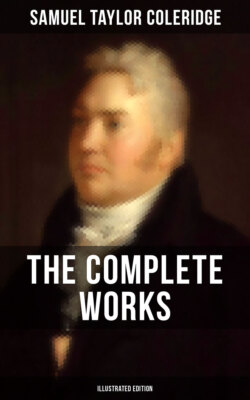Читать книгу The Complete Works of Samuel Taylor Coleridge (Illustrated Edition) - Samuel Taylor Coleridge - Страница 71
На сайте Литреса книга снята с продажи.
LINES
ОглавлениеTable of Contents
Left upon a seat in a YEW-TREE, which stands near the Lake of ESTHWAITE, on a desolate part of the shore, yet commanding a beautiful prospect.
— Nay, Traveller! rest. This lonely yew-tree stands
Far from all human dwelling: what if here
No sparkling rivulet spread the verdant herb;
What if these barren boughs the bee not loves;
Yet, if the wind breathe soft, the curling waves,
That break against the shore, shall lull thy mind
By one soft impulse saved from vacancy.
— Who he was
That piled these stones, and with the mossy sod
First covered o’er and taught this aged tree
With its dark arms to form a circling bower,
I well remember. — He was one who owned
No common soul. In youth by science nursed
And led by nature into a wild scene
Of lofty hopes, he to the world went forth,
A favored being, knowing no desire
Which genius did not hallow, ‘gainst the taint
Of dissolute tongues, and jealousy, and hate
And scorn, against all enemies prepared.
All but neglect. The world, for so it thought,
Owed him no service: he was like a plant
Fair to the sun, the darling of the winds,
But hung with fruit which no one, that passed by,
Regarded, and, his spirit damped at once,
With indignation did he turn away
And with the food of pride sustained his soul
In solitude. — Stranger! these gloomy boughs
Had charms for him; and here he loved to sit,
His only visitants a straggling sheep,
The stone-chat, or the glancing sand-piper;
And on these barren rocks, with juniper,
And heath, and thistle, thinly sprinkled o’er,
Fixing his downcast eye, he many an hour
A morbid pleasure nourished, tracing here
An emblem of his own unfruitful life:
And lifting up his head, he then would gaze
On the more distant scene; how lovely ‘tis
Thou seest, and he would gaze till it became
Far lovelier, and his heart could not sustain
The beauty still more beauteous. Nor, that time
When Nature had subdued him to herself
Would he forget those beings, to whose minds,
Warm from the labours of benevolence,
The world, and man himself, appeared a scene
Of kindred loveliness: then he would sigh
With mournful joy, to think that others felt
What he must never feel: and so, lost man!
On visionary views would fancy feed,
Till his eye streamed with tears. In this deep vale
He died, this seat his only monument.
If thou be one whose heart the holy forms
Of young imagination have kept pure,
Stranger! henceforth be warned; and know, that pride,
Howe’er disguised in its own majesty,
Is littleness; that he, who feels contempt
For any living thing, hath faculties
Which he has never used; that thought with him
Is in its infancy. The man, whose eye
Is ever on himself, doth look on one,
The least of nature’s works, one who might move
The wise man to that scorn which wisdom holds
Unlawful, ever. O, be wiser thou!
Instructed that true knowledge leads to love,
True dignity abides with him alone
Who, in the silent hour of inward thought,
Can still suspect, and still revere himself,
In lowliness of heart.
THE FOSTER-MOTHER’S TALE.
A Narration in Dramatic Blank Verse.
But that entrance, Mother!
